10 Sep 14 | Academic Freedom, Egypt, News and features, Politics and Society
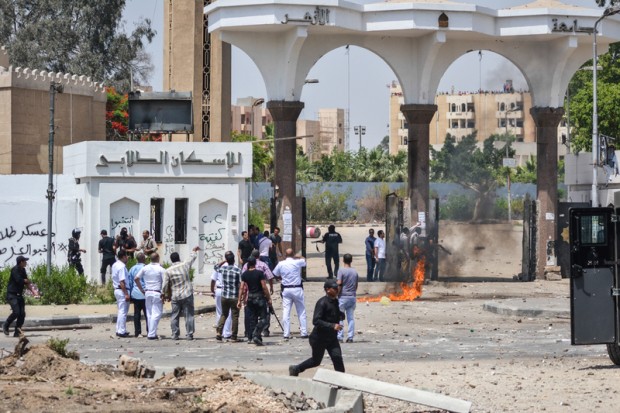
In May 2014, Egyptian security forces entered a student housing area of Al-Azhar University, during clashes with student protesters in Cairo. (Photo: Ahmed Hendawy /Demotix)
With just a few weeks to go before Egyptian universities open their gates to students for the start of the new academic year, the Egyptian authorities are feeling jittery — and rightly so.
The previous academic year saw an unprecedented wave of violence at universities across the country with clashes between “anti-coup” student-protesters and security forces on an almost daily occurrence that forced the repeated postponement of exams. At least 14 students were killed in the violence, hundreds of others were detained and hundreds more were expelled for organising or taking part in protests, according to Al Ahram.
Ahead of the new academic year, the authorities have taken some new, stringent measures to ensure the past year’s scenario is not repeated. They have also issued stern warnings to students that they will adopt a “zero tolerance approach” towards dissent. Any student who criticises President Abdel Fattah El-Sisi or any “symbol of the state” face repercussions. According to warnings issued last week by two major state universities –Ain Shams and Bani Suef — students who violate university regulations by “defaming public officials” will be subject to an internal disciplinary investigation and risk expulsion.
The announcement drew angry outcries from students and rights advocates who expressed their concern on social media. Critics fear the new regulation would curb the rights to free speech and expression. Since the 3 July ouster of Islamist President Mohamed Morsi by military-backed protests, the Egyptian authorities have imposed sweeping restrictions on freedom of expression. The massive security crackdown on dissent has targeted Islamists, liberal activists , journalists and academics.
A draconian law passed last November bans protests without prior permission from the authorities. Scores of liberal opposition activists including several prominent figures in the January 2011 mass uprising have been imprisoned for protesting against the repressive legislation. Hundreds of Muslim Brotherhood supporters also languish behind bars for staging “anti-coup” protests following the overthrow of Morsi.
In February, an Egyptian court approved the stationing of police forces at universities, overturning a 2010 verdict banning police presence at educational institutions. The Ministry of Interior hailed the latest court decision, saying the police deployment was “necessary” to quell opposition protests led by supporters of the outlawed Muslim Brotherhood (designated by Egypt as a terrorist organisation following Morsi’s ouster). The beefed-up security presence at universities has resulted in the arrests of hundreds of students and the deaths and injuries of dozens of others over the course of the past year. Many of the detained students have been sentenced to between 3 and 17 years in jail on charges of staging unauthorised protests, having links to a terror group and inciting violence.
Meanwhile, Minister of Endowments Mokhtar Gomaa has called for a purge of Islamist-leaning deans, staff and faculty members from state universities. The independent Mada Masr quoted Minister Gomaa as saying that universities should be “cleansed of academics sympathetic to the banned terrorist group”. He has also demanded that firm action be taken against the so-called “Academics Against the Coup” — an Islamist partisan group of scholars whose members are purportedly connected Al-Azhar University’s board of directors.
In another restrictive move, Cairo University Head Gaber Nassar has called for the dissolution of student groups or organisations of any political affiliation at all universities. According to Al Youm El Sabe’ newspaper, new students enrolling at universities will now be requested to sign a document pledging not to engage in any political activities on campus.
While the government insists the new measures are part of its ongoing war against terrorism and claims that the upsurge in violence at universities is “an extension of the nationwide Muslim Brotherhood insurgency”, a security source told Index that the ban on student protests goes beyond suppressing the Muslim Brotherhood rebellion. Speaking on condition of anonymity, he said that “the ban is not just aimed at restoring stability”.
“The government wants to spread a culture of submission and fear similar to that which prevailed under Hosni Mubarak. It is trying to instil the idea that the opposition is evil and must be crushed,” he added, warning that “students engaging in political activities will be accused by both the authorities and ‘patriotic’ government supporters of being affiliated to the terrorist group.”
The latest restrictions are a far cry from the period between the 1930s and the 1970s when Egyptian state universities were a hotbed for political activism and the student movement was an instrumental political force in Egyptian society. That ended, however, with amendments introduced to the student charter by late President Anwar Sadat in 1979. The changes “essentially were intended to undermine the power and activism of students on campus by dissolving the representative student bodies,” author Hisham Adawi wrote in his book In Pursuit of Legitimacy published in 2004. While Hosni Mubarak, the authoritarian leader toppled by the 2011 protests, was relatively more tolerant of political expression and dissent than his predecessors Gamal Abdel Nasser and Sadat (at least during the early years of his rule), he too cited fears that “the university’s faculties were becoming strong recruiting points for militants”. Using this as a pretext, he again altered the charter to allow further administrative and security intervention in student activities. Mubarak’s amendments drew criticism from rights advocates who sarcastically called it “the State Security Charter” (in reference to the autocratic leader’s detested security apparatus). Despite sporadic periods of heightened tensions — particularly at Al Azhar and Cairo University — there has since been no true revival of the student movement as an influential political force in society.
Despite the recent warnings by the authorities, angry students staged a small rally outside Cairo University last Wednesday to protest the new measures. The protesters denounced the restrictions, chanted anti-government slogans and demanded the release of their detained colleagues and academics. No fewer than 160 faculty members and staff have been arrested and detained since the July 2013 overthrow of President Morsi, according to an April 2014 report compiled by Egyptian academic rights groups and posted on the Al Jazeera Arabic website. Several academics charged with “supporting the outlawed Muslim Brotherhood” remain at large and have either fled the country or gone into hiding.
Dr. Emad Shahin — an internationally renowned scholar of political Islam who has taught at Harvard, Notre Dame and the American University in Cairo — was charged with espionage in January. He is listed as one of the defendants in a criminal case against several Muslim Brotherhood leaders (including the deposed President Morsi) and stands accused of “conspiring with foreign organisations to undermine Egypt’s national security”. An outspoken critic of the bloody crackdown on Morsi’s supporters after the military takeover, Shahin learnt of the arrest warrant against him while on a visit to Washington nine months ago. He has since remained in the United States and has denied the charges in an email to the New York Times. “The accusations against me are baseless, politically motivated and beyond preposterous,” he said.
Amr Hamzawy, a liberal political scientist and former lawmaker and senior associate at the Carnegie Middle East Centre in Beirut, has also been charged with “insulting the judiciary”. In January, a lawsuit was filed against him by a lawyer after he questioned (on Twitter) a verdict against a group of foreign non-governmental organisations. Hamzawy was released after being investigated for several hours by the public prosecutor.
In a new case that has fuelled concern among rights advocates, Dr. Mohamed Tarek, an adjunct professor at the faculty of science at Alexandria University, was arrested, detained and allegedly tortured last week. He was arrested on 29 August from a street near his home in Alexandria, and has been held in custody since. Police later raided his home and confiscated his laptop and other personal belongings. There have been conflicting reports of his arrest: Interior Ministry sources claim they arrested him during a protest march in Moharram Beik district in Alexandria. Rights groups meanwhile, insist he was detained for giving his testimony of last year’s Raba’a massacre to Human Rights Watch. Tarek was injured in clashes with security forces during the forced dispersal of a sit-in staged by supporters of Morsi outside Raba’a El Adaweya Mosque in the Cairo neighbourhood of Nasr City in August 2013. His chilling account of the forced evacuation featured in a damning report released by Human Rights Watch last month.
According to the 195-page report titled All According to Plan, Egyptian police and the army used “grossly disproportionate and premeditated lethal force against overwhelmingly peaceful opposition protesters” resulting in the killings and injuries of hundreds of them in a single day of violence. The report describes the Raba’a deaths as “likely crimes against humanity” and calls for those responsible to be brought to justice. The Egyptian government has dismissed the report as “politicised” and “biased”. Days after the release of the report, Cairo Airport authorities prevented Human Rights Watch staff members from entering the country, saying the organisation “has no legal status that would allow it to operate in the country”. Human Rights Watch said the move was “an attempt by the Egyptian authorities to gag critics”.
While Egyptian authorities are hoping the new proposed measures will help end violence at state universities, sceptics warn the clampdown on freedoms can only further fuel the unrest. With the new academic year scheduled to begin on October 11 (instead of in late September as originally planned), many worry about a fresh eruption of unrest that may well result in even more bloodshed.
This article was posted on 10 Sept 2014 at indexoncensorship.org
29 Aug 14 | Egypt, Middle East and North Africa, News and features
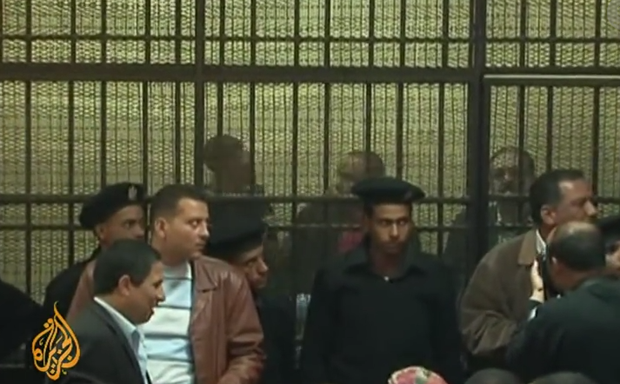
Defendants in Egypt’s NGO trial held in cages during proceedings (Image: Al Jazeera English/YouTube)
In an apparent attempt to crackdown on criticism of Egyptian authorities, non-governmental organisations (NGOs) in the country have been given an extra 45 days (previously, NGOs were given until 2 Sept) to register with the government, or risk being shut down or prosecuted. This action is being taken under the much-criticised Law 84, passed by former president Hosni Mubarak. It allows the government to dissolve organisations, freeze their assets, confiscate their property and block their funding, without judicial review. At the same time a new law concerning NGOs has been proposed, under which activists face 15 years in prison and fines of over £8,000 for activities such as operating without a licence or working with international groups without permission.
Independent groups in Egypt have been targeted by authorities for many years. In 2012, a group of 43 Egyptian and foreign NGO workers were convicted of operating without a licence and receiving foreign funding, in the widely condemned “NGO trial“. Twenty-seven of the defendants were tried in absentia, and have so far avoided serving the five-year sentences handed down to them. But being convicted as an NGO worker in Egypt has consequences far beyond that country’s borders, as Michelle Betz, one of the 27, writes.
—
It was bad enough to learn that I had been indicted by Egypt in the 2012 NGO case but only a short time later my world seemed to collapse around me.
I was in the US Virgin Islands enjoying my first holiday in over a year when I received an unexpected phone call informing me that Egyptian officials had gone to Interpol, the world’s largest international police organisation, asking them to issue red notices on me (and several others) as they considered me a “fugitive” and wanted me to face trial in Cairo; this despite the fact that I had never actually worked in Egypt.
I had no idea what a red notice was or what the implications were, but I quickly learned just how serious this situation was going to be. An email from the head of the NGO for which I had been consulting said: “I just got off the call with the [US] government and I must ask you all to refrain from travel for the time being. Michelle, you are in the US Virgin Islands, so returning home should not be a problem. If you have other travels plans, you need to put them on hold.”
My work in media development and press freedom requires frequent travel around the world. If I couldn’t travel, I couldn’t work. My career came to a screaming halt. I scrambled to find someone to take my place for contracts I was obliged to fill. All the while, I struggled to get my head around the fact that I was “wanted” and considered a “criminal”. The situation soon went from bad to worse. I learned that not only had Egypt requested that Interpol put out a red notice calling for my arrest and extradition from wherever I might be in the world; they also put out a little known, and not frequently discussed, diffusion notice.
Having never been accused of any crimes in my life, I began educating myself on what red notices and diffusions are, the power of Interpol and its member states, and the inability of regular people, such as me, to obtain due process or even receive basic information about their cases.
What I learned shocked me. Member countries of Interpol can unilaterally put out a so-called diffusion notice without any review from Interpol or even the country of citizenship of the alleged criminal. This notice is immediately sent to all subscribers of the Interpol database and puts countries on notice they should hold and seek extradition of the individuals named. I learned that, as in my case, with no review and no due process, this system has reportedly become rife with abuses in harassment of individuals for political crimes.
At that point, my quest to seek answers to legal questions such as extradition, red notices and diffusion became truly farcical. I tried to contact Interpol as the US Justice Department would not answer my questions. Justice said that I had to turn to my “local law enforcement agency” — in this case, Washington, DC Metro Police Department (MPD) — and Interpol does not take calls from individuals. The Interpol website offers no advice or support for those facing difficulties with their system. After speaking to numerous people at MPD, I was finally referred to a nice lady who, although sympathetic, didn’t even know what Interpol was, let alone the who the Interpol liaison at MPD was, if there even was one.
I repeatedly sought clarification from both the US Departments of Justice and State about what would trigger an airport stoppage due to a red notice or diffusion, my rights, who could help me, even on whether getting a new passport would help. I asked if anybody could help me to determine if there were countries I could safety travel to without fear of extradition. These queries were never answered and more than two years later I still await answers.
It is ironic that in a news release dated 23 April 2012, Interpol stated that: “Anyone seeking the truth about Interpol’s involvement, or otherwise, in any matter should contact the organisation directly in order to ascertain the facts, rather than making statements based on ill-founded rumour and speculation.” Of course, the problem is that Interpol will not take calls from individuals (such as myself) to answer questions and ascertain facts.
In the end, apparently some behind the scenes negotiations occurred resulting in a statement by Interpol in which they asked member countries to erase the already issued diffusion notices from their databases. But I have no way of knowing if these notices were removed, how long they might remain active, or even if I am at risk of future diffusions from the Egyptian authorities.
In June 2013, we faced this situation anew as the Egyptian prosecutor publicly stated they will again seek extradition and put out international wanted notices through Interpol after my colleagues and I were given stiff sentences of five years hard labour. This came after being tried in absentia by what many have portrayed as a kangaroo court.
The past two and a half years have been incredibly stressful, mentally exhausting, frustrating and career-destroying in part due to the lack of information available from Interpol concerning my case. There is no accountability of this organisation and its procedures to which the US (and nearly 200 other countries) is a signatory.
Those of us who are being harassed by member states for political purposes, such as in the Egypt NGO case, have no access to due process and there is no transparency. And while our types of case may be a minority of those pursued using the instruments that Interpol provides, our stories need to be heard and the injustice we are facing needs to be addressed. Otherwise Interpol risks being misused as a tool for oppression by authoritarian and corrupt governments.
A version of this article has been published on Fair Trial International.
22 Aug 14 | Egypt, Middle East and North Africa, News and features
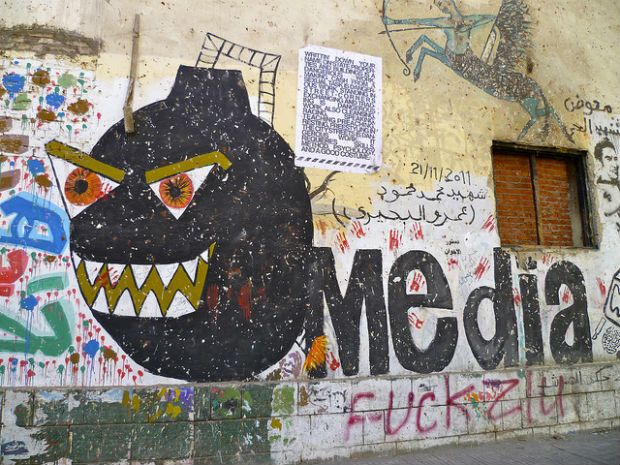
Street art from Mohamed Mahmoud Street, Cairo. (Photo: Melody Patry/Index on Censorship)
Before the January 2011 uprising, street art was little known in Egypt. Then came the revolution and with it, an outburst of creativity.
With the fall of the authoritarian regime of Hosni Mubarak, Egyptian artists who had routinely faced censorship restrictions under his autocratic rule, felt a strong urge to break out of the confines of their studios and reclaim public spaces. Young artists in particular, decided they needed bigger canvases for the grand ideas they wanted to convey through their paintings. To celebrate their newfound liberation, many of them took their art directly to the people and onto the streets, expressing their views and opinions on public walls and on the sides of buildings.
Bonded by their shared aspirations for a better Egypt, the young graffiti artists spent long hours working together, creating vivid group murals that told the stories of the revolution in which they had actively participated. The images they produced in the months following the 2011 uprising documented the dramatic changes that were unfolding in the country, the continued unrest ensuring a steady supply of material for them to work with. The artists also spread powerful messages of “equality” and “freedom” that helped shape public opinion, attitudes and values.
“Our murals added colour to the otherwise dull streets and boosted the morale of the people. But as graffiti artists and activists, we also played the role of the ‘alternative critical media,’ telling the untold stories and spreading messages that helped the public better understand what was really happening on the ground,” said graffiti artist Salma Sami, a graduate of fine arts who has also worked as a broadcaster.
An image of Pinnochio on TV, spray-painted on a wall on Mohamed Mahmoud Street, off Tahrir Square, shortly after the fall of Mubarak, was intended to poke fun at state media — for long, a propaganda tool of the ousted Mubarak regime. According to Sami, the mural also “serves as a warning to Egyptians not to believe everything the media tells them”.
Besides being a critical voice, raising awareness and informing the public of the events unfolding in the country, Cairo’s nascent street art movement also helped keep the spirit of the January 25 revolution alive.
“As a woman, I wasn’t accustomed to working in the street and was afraid at first especially after hearing stories of sexual assault incidents in the very neighbourhood where we worked. But once I started working, I felt safe. Working in a group helped us revive the spirit of the revolution, letting go of our fears and uniting behind a common goal,” Sami said.
The street artists successfully managed to break down social barriers of class, religion and gender. They created a close-knit community among themselves but were also accessible to the public.
“Crowds would often gather to watch as we worked and then, someone would volunteer to help. Soon, we would find others joining in. The fact that a lot of our work was painted with roller brushes made it easy for anyone to participate,” Sami told Index.
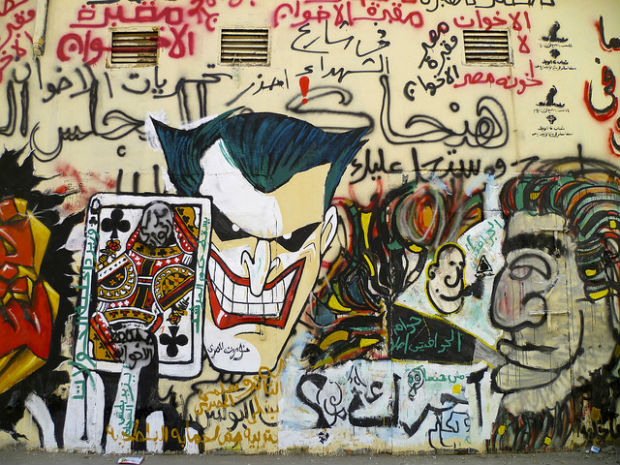
(Photo: Melody Patry/Index on Censorship)
Like Sami, Bahia Shehab — an art historian and graphic designer — was also very much a part of the street art movement that emerged and developed after the 2011 revolution. Her trademark “no” stencils, spray painted on the walls of Mohamed Mahmoud Street have helped draw public attention to social problems, exhorting Egyptians to take a stand against violence, oppression, and other forms of injustice.
Shehab joined the street art movement nine months after the revolution when she saw an image of a protester’s corpse dumped in a pile of rubbish in her Facebook newsfeed. The gruesome picture, which had gone viral on social media networks, so infuriated her that she rushed to Tahrir Square to express her rage. Her stencilled message “no to military rule” marked the beginning of her “thousand times no” campaign — a series of images decrying torture, sexual violence and other issues she felt strongly about.
Carrying on the idea from her 2010 book — a compilation of “one thousand no-s” in a multitude of Arabic calligraphy styles — she added a range of fiery messages denouncing rights abuses that were committed during the country’s transitional period. ”No to violence and thuggery”, “no to stripping girls” and “no to sectarian divisions” are just a few in her long list of stencilled images.
More than three years after the uprising that toppled autocrat Hosni Mubarak, Shehab says her “old” list is “still relevant” and her concerns “still valid”. She continues to consistently add more “no” messages, saying she is “deeply disappointed” with the turn of events in her country. Among the new additions is a stencil calling for an end to the brutal security crackdown on dissent.
A nationalist fervour sweeping the country has however made it dangerous for graffiti artists to express themselves freely. Those who dare criticise government policies are often accused of being “traitors” and “terrorists” by self-proclaimed “patriots”. Today, while many of the young street artists view former army chief and current president Abdel Fattah el-Sisi as merely the new face of the old military regime, few dare depict him in their artworks. Sisi came to power following the 2013 coup that overthrew Egypt’s first democratically elected president, the Muslim Brotherhood’s Mohamed Morsi. Several established street artists have chosen to remain anonymous, signing their artworks using nicknames for the sake of their security.
“Working in the street has always been dangerous,” noted Shehab, adding that “the only difference is that the danger now comes from violent ‘patriotic’ mobs supporting the military where before it was from the police.”
But mob violence is not the only danger threatening Egypt’s street art movement. A proposed draft law banning so-called “abusive graffiti art” — if passed — may likely restrict artistic expression and may spell the end of the graffiti tradition, even before it fully emerges. Under the draft law, violators could face a prison sentence of up to four years or a fine of up to 100,000 Egyptian pounds.
The recent alleged murder of one of Shehab’s comrades — 19 year-old graffiti artist and member of the April 6 youth movement Hisham Rizk — has compounded her fears, sending shivers down many spines in Egypt’s artistic circles. Rizk’s body was found in a Cairo morgue last month, a week after his family reported his “mysterious disappearance”. A forensic report concluded that the young artist had died of “asphyxiation by drowning in the Nile River”. Sceptical fellow artists however, believe Rizk’s critical views of the government expressed in his drawings and on Facebook may have instigated a confrontation with security officials that led to his death.
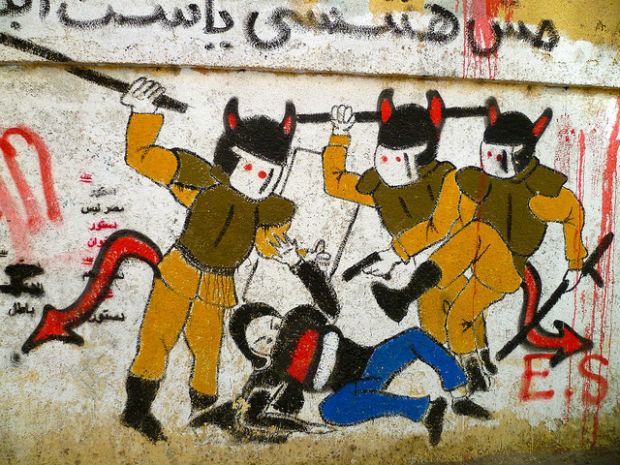
(Photo: Melody Patry/Index on Censorship)
“People don’t always agree with our views and different people interpret our artworks in different ways but at least our murals provide food for thought,” noted Sami who, in early 2012, designed a controversial mural depicting a skull with a military cap, holding a flower between clenched teeth. The image was a fitting portrayal of the brutal military regime that replaced Mubarak after the revolution. The 18-month rule of the Supreme Council of the Armed Forces (SCAF) was marred by political turmoil and violence including forced virginity tests performed by the military on female protesters
You can still see Sami’s mural on Mohamed Mahmoud Street, along with many others that are critical of both SCAF and the Muslim Brotherhood. The latter are depicted as sheep, while military men are portrayed as butchers in some of the murals. The colourful artworks are reminiscent of a happier time of free artistic expression and hope — a phase that, some of the artists fear, may well be over.
Yet, both Sami and Shehab remain defiant, saying that neither laws nor intimidation will deter them from the journey they have started. They draw similarities between their art and the 2011 revolution, saying both are constantly shifting and come in waves. Their murals in downtown Cairo have been whitewashed several times with other artists painting over them or adding new images as new events unfold, sparking new ideas. “Sometimes, residents in the area paint over the images if they oppose our views,” said Sami.
“I no longer mind when my work disappears. When that happens, I just tell myself it’s time to design a new stencil and I head straight back to Mohamed Mahmoud Street.”
The Index on Censorship interactive documentary Shout Art Loud explores how Egyptians use graffiti and other art forms to tackle the issue of sexual harassment and violence against women. Watch it here.
This article was posted on August 22, 2014 at indexoncensorship.org
18 Jul 14 | Mapping Media Freedom, Netherlands, News and features
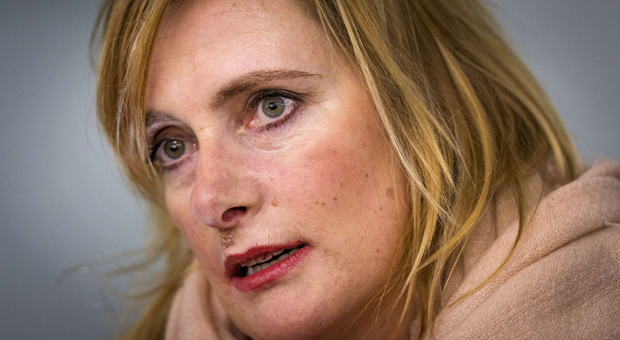
Rena Netjes
Dutch journalist Rena Netjes was sentenced in absentia to ten years in prison in Egypt. The Egyptian government’s case against her and other journalists generated media interest from around the world. With the help of her colleagues at the Dutch Union for Journalists she’s now raising the issue of human rights and press freedom violations in Egypt in The Netherlands and abroad.
When freelance correspondent Netjes arrived at Schiphol airport on the 4th of February this year, she had just slipped out of Egypt after finding out she was blacklisted by the Egyptian government and would have to stand trial for on charges of working for Al Jazeera, terrorism and endangering national security. At home in The Netherlands, she recounted her escape with the help of Dutch diplomats in Egypt to newspapers and television in what seemed like a media circus.
While Netjes managed to flee Egypt, her colleagues were not so fortunate. Three Al Jazeera journalists, the Canadian-Egyptian Mohamed Fahmy, Egyptian Baher Mohamed and the Australian Peter Greste, have been sentenced to seven years, after being held in an Egyptian prison since December 2013.
In June, from the safety of her living room in The Netherlands, she learned that she has been sentenced to ten years in prison. She was convicted on the charges of spreading false information and promoting the banned Muslim Brotherhood. She was accused of working for Al Jazeera, which the Egyptian government claims promotes the views of the Muslim Brotherhood. Netjes says she only had coffee with the chief editor on one occasion. British journalists Sue Turton and Dominic Kane have also been sentenced in absentia to ten years imprisonment.
For Netjes, who lived and worked in Egypt for many years, the verdict means she might never be able to set foot in the country again.
“It’s still an emotional roller coaster,” she told Index on Censorship. She’s relieved to be free but is concerned about her colleagues now. “It’s hard to imagine these guys are in prison, in the hands of sadists.”
Her career as a foreign correspondent in Egypt is over, for now at least. Netjes would run the risk of being arrested if she returned. She can’t even go to most countries in the Middle East because of extradition agreements. “Even Lebanon extradites ‘terrorists’ to Egypt”, she said.
With the spotlight on her in The Netherlands, Netjes said she sees an opportunity to generate attention for Egypt’s human rights violations, the lack of press freedom and specifically the plight of the other journalists, who weren’t able to escape prison sentences. “They now depend on international pressure, by politicians and diplomats behind the scenes, but also on awareness raised by colleagues around the world”.
Netjes speaks frequently to Dutch and international media and is invited to panel discussions and public human rights events. “I’m trying to turn this traumatic experience into something positive,” she said. “I have a more platform to explain what is going on Egypt, to raise the subject of the abuses in Egypt”.
The Dutch Union for Journalists (Nederlandse Vereniging voor Journalisten, NVJ) jumped in to support Netjes’ case and the campaign for free media in Egypt. On July 8, NVJ-President Marjan Enzlin paid a visit to the Egyptian embassy in The Netherlands to address the issue.
At the embassy Enzlin expressed her concern about the trial and her worries about the lack of freedom for media in Egypt. “We told him these verdicts are a strong violation of press freedom. We asked him to deliver this message to his president”, she told Index on Censorship. “He told us he is not in the position to intervene. And then he even lectured us on how western media is poorly informed and is deliberately spreading negative stories about Egypt. It was ridiculous”.
Enzlin acknowledges that without Netjes’ involvement, the case probably wouldn’t have generated so much attention in Dutch media and politics. “It is because of Rena that this case is so high on the Dutch agenda. But through Rena, we should now fight for the others. We as free journalists in a free country have to make noise about the case. We should be a thorn in one’s side”.
Being one of the highest ranked countries in terms of media freedom, Enzlin believes the Dutch media should stand up. “The resistance needs to come from here”, she said. “We are spoiled in The Netherlands. We see it as our duty to support and help our colleagues in countries like Egypt”.
Immediately after the verdict in Egypt, the Dutch Minister of Foreign Affairs Frans Timmermans summoned the Egyptian ambassador. The Dutch government insists the trial wasn’t fair, and urged Egypt to improve human rights. The NVJ wants to make sure this kind of diplomatic pressure won’t wane over time. “This requires long term commitment, we have to keep the pressure up”, Enzlin says.
The NVJ has several actions and protests lined up. They will publish a photo gallery on their website of all journalists who have been convicted in Egypt. They have sent a letter to the Egyptian ambassador in The Netherlands asking for assurances that Netjes can travel to the country for her appeal without fear of detention. If Netjes can’t go to Egypt safely, the NVJ requested to go in her place.
After the Dutch parliament’s summer recess, the NVJ will ask for another meeting with the Egyptian ambassador. They plan to invite MPs to join them to add more political pressure. The union will also organise a protest at Amsterdam’s Schiphol Airport, in front of the gate for flights to Egypt. “We will make banners saying ‘journalists are not terrorists’. Something Egypt will not be happy with.”
Netjes is still publishing stories on issues in Egypt. “I still have my sources in Egypt feeding me with information because they see that I am in the position to speak and write freely”. Meanwhile, spreading the word about the deplorable situation for journalists and activists in Egypt became a mission on its own.
“I am deprived of my freedom to travel, but that is nothing compared to what the guys who are imprisoned are going through”, she said. “I will not rest before they are free.”
This article was updated on July 21, 2014 to reflect that Marjan Enzlin is the President of NVJ, not Director as previously stated.
More reports from The Netherlands via mediafreedom.ushahidi.com
Journalist denied entrance to public court hearing
‘Rules for using drones by journalists too restricted’
Journalists’ cameras seized by police
Dutch magazine on trial for photographing princess
This article was posted on July 18, 2014 at indexoncensorship.org






